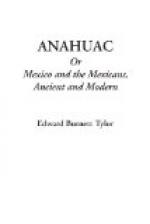Though they were a commercial people, and had several substitutes for money—such as cacao-grains, quills of gold-dust, and pieces of tin of a particular shape, they had no knowledge of the art of weighing anything, but sold entirely by tale and measure. This statement, made by the best authorities, their language tends to confirm. After the Conquest they made the word tlapexouia out of the Spanish “peso,” and also gave the meaning of weighing to two other words which mean properly to measure and to divide equally. Had they had a proper word of their own for the process, we should find it. The Mexicans scarcely ever adopted a Spanish word even for Spanish animals or implements, if they could possibly make their own language serve. They called a sheep an ichcatl, literally a “thread-thing,” or “cotton”: a gun a “fire-trumpet:” and sulphur “fire-trumpet-earth.” And yet, a people ignorant of some of the commonest arts had extraordinary knowledge of astronomy, and even knew the real cause of eclipses,[21] and represented them in their sacred dances.
Set the difficulties on one side of the question against those on the other, and they will nearly balance. We must wait for further evidence.
Our friend Don Jose Miguel Cervantes, the President of the Ayuntamiento, took us one day to see the great prison of Mexico, the Acordada. As to the prison itself, it is a great gloomy building, with its rooms and corridors arranged round two courtyards, one appropriated to the men, the other to the women. A few of the men were at work making shoes and baskets, but most were sitting and lying about in the sun, smoking cigarettes and talking together in knots, the young ones hard at work taking lessons in villainy from the older hands; just the old story.
Offenders of all orders, from drunkards and vagrants up to highway robbers and murderers, all were mixed indiscriminately together. But we should remember that in England twenty years ago it was usual for prisons to be such places as this; and even now, in spite of model prisons and severe discipline, the miserable results of our prison-system show, as plainly as can be, that when we have caught our criminal we do not in the least know how to reform him, now that our colonists have refused him the only chance he ever had.
It is bad enough to mix together these men under the most favourable circumstances for corrupting one another. Every man must come out worse than he went in; but this wrong is not so great as that which the untried prisoners suffer in being forced into the society of condemned criminals, while their trials drag on from session to session, through the endless technicalities and quibbles of Spanish law.




